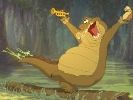Eye For Film >> Movies >> The Princess And The Frog (2009) Film Review
Much like its titular characters, The Princess and the Frog suffers something of an identity crisis.
On the one hand, it sets itself up to be a Disney cartoon feature par excellence. Its opening image is a Southern mansion with more than a passing resemblance to the enchanted castle on the Disney logo. Its first scene shows young Tiana and Charlotte, both dressed as princesses, enraptured as the popular Brothers Grimm fairytale The Frog Prince is read to them by Tiana's mother Eudora (voiced by Oprah Winfrey) – reprising the common Disney motif of beginning a feature with images of the storybook from which the film's plotting has been adapted. The animation itself attains Disney's usual heights of critic-proof glory, and of course the principal characters – an adult Tiana (Anika Noni Rose) and Prince Naveen (Bruno Campos) - are guided along their uplifting narrative arc by a collection of comedy sidekicks including jazz-mad alligator Louis (Michael-Leon Wooley) and light-hearted Cajun firefly Ray (Jim Cummings). And, last but not least, there is much talk of that most essential and iconic of Disney activities, wishing upon a star.

Yet there are all manner of subversive elements to trouble the waters of Disney's usual cosy formula. First there is the New Orleans setting, which may allow the introduction of all kinds of local colour – jazz, voodoo, Cajun cooking, bayou fauna – to the classic tale, but which also imports a decidedly uncomfortable contemporary resonance to a story where the gulf between the haves (Charlotte and family) and the have-nots (Tiana and family) is paramount. In the post-Katrina age, anyone can see that Tiana's dreams of opening a riverside restaurant will eventually, one way or another, be swept away.
When Tiana is accidentally transformed into a frog while trying to turn Prince Naveen (Bruno Campos), himself in batrachian form, back into a human, their adventures together in the swamp bring about an exchange of values, as the over-industrious waitress learns to live a little, while the womanizing, money-squandering royal discovers the importance of hard work and commitment. Meanwhile 'voodoo queen of the bayou' Mama Odie (Jenifer Lewis) teaches them both the crucial distinction – freely adapted from the Rolling Stones - between what you want and what you need.
Indeed, everyone here is driven by their wants, and oblivious to what they need. Tiana's ambitions for her restaurant have excluded everything else from her life. Cut off by his own family for his prodigal conduct, Naveen will do anything to regain his playboy lifestyle. Spoilt Southern belle Charlotte (Jennifer Cody) has her heart set on marrying a prince – any prince. Voodoo-wielding villain Dr Facilier (Keith David) will stake his very soul on taking over New Orleans, while Naveen's valet Laurence (Peter Bartlett) will stop at nothing – not even deceit, treachery and witchcraft – to supplant the Prince.
This is where the film's second - and main - subversion of Disney's normative values comes in. Characters might regularly be shown calling upon the agency of a celestial body to fulfil their deepest desires, but from the start it is suggested that wishing upon a star is an insufficient, or even vain, route to achieving what you want in life. "That old star can only take you part of the way," Tiana is told as a girl by her father. "You can't just wish on a star," Tiana later tells her friend Charlotte, who, despite being the film's most outspoken advocate of star-wishing, is herself forced to admit, "I was starting to think that wishing on stars was just for babies and crazy people."
Ray's unquestioning conviction that the star is in fact a bright, if aloof, firefly named Evangeline ("she's quite shy, don't say much, but I know in my heart some day we're gonna be together.") is presented as part and parcel of his folksy naïveté – and when, later, Tiana tells Ray "just because you wish for something, doesn't make it come true – Evangeline's just a star, Ray", her attempt to disillusion her winged friend would seem also to dismantle one of the mainstays of the Disney ideology: the twinned notions of faith and providence. Tiana and Naveen may have been reduced to animals, but their problems seem to require not fanciful thinking or divine interventions, but rather solutions of a purely humanist nature.
Unfortunately, somewhere along the way someone appears to have had a loss of nerve, and so the revolution in MouseLand, though tantalisingly glimpsed, proves to be short-lived. After a warts-and-all dénouement in the swamp that, for all its un-Disney like qualities, seems absolutely true to the values that the film has espoused up to that point, the film suddenly lurches into an unnecessary coda that undoes all this good work, and brings us right back to an affirmation of the Disney – which is to say, the American – Dream. Now once again, when money talks, fairytale wishes really do come true – and like one of the characters at the film's masked ball, The Princess And The Frog is the Disney film that pretends not to be a Disney film, but in the end cannot help lowering its mask and reverting to type.
This will no doubt be lost on younger members of the audience for whom all the colourful singing and dancing, butt jokes and animal tomfoolery are likely to be distraction enough. Older viewers, however, may find that the film's mixed message rankles in the gut like overspiced gumbo, as their daughters emerge with their wishes, rather than their needs, fulfilled, believing that if they only want it hard enough, the latest associated Disney merchandise will after all be theirs for the taking.
Reviewed on: 30 Jan 2010


















